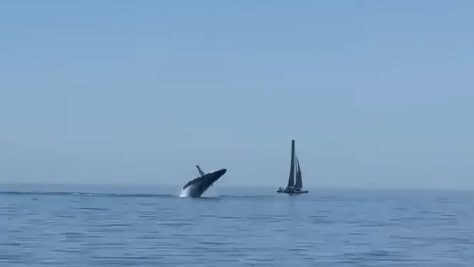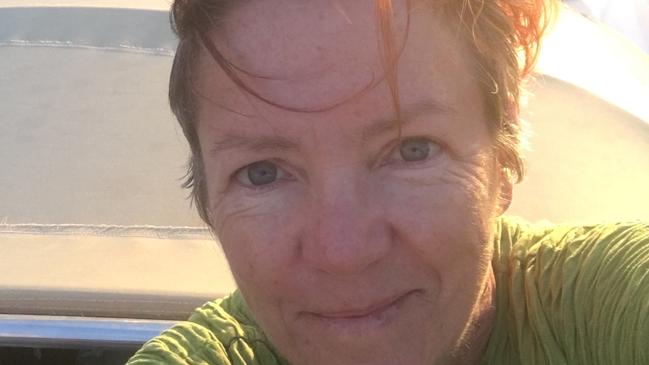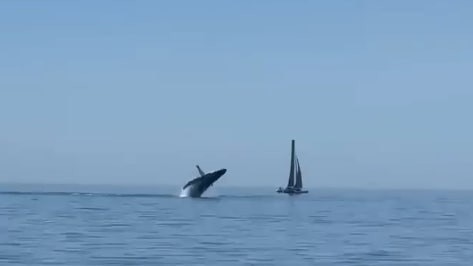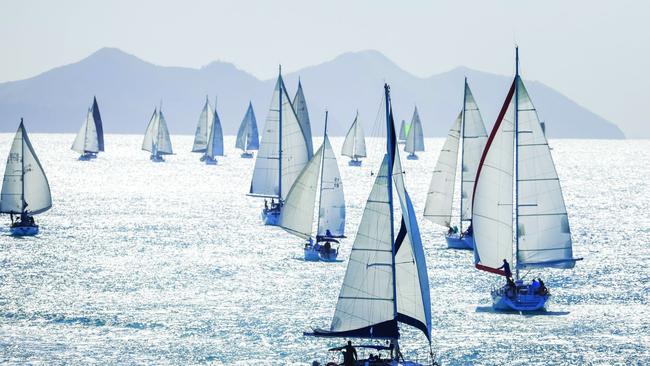Boatie bragged of ‘smoking whale’ amid row over collisions
A man who allegedly ‘smoked a whale’ has sparked concerns from experts who say this season’s record number of whale interactions could clash with unprecedented human activity in the same waters. SPECIAL REPORT

Whitsunday
Don't miss out on the headlines from Whitsunday. Followed categories will be added to My News.
A skipper allegedly boasted about colliding with a whale in a feeder race between Brisbane and the Whitsundays prompting community members to ask for more to be done to protect the marine mammals.
As the region, renowned as an important nursery for whales, is in the middle of its migrating season there has been record numbers of interactions with a major military exercise taking place on the Great Barrier Reef as well as a large number of boat races.
A Maritime Safety Queensland (MSQ) spokesman said eight marine incidents between 2018 and 2023 involving collisions between recreational boats and whales were reported with the last incidents reported in the Mackay region in 2021.
But Whitsunday Sailing owner Lindsay Simpson said the number of whale collisions was minimal since “nothing is reported”.

The reported number of whale collisions depends heavily on whether people involved do actually report them when there is an incident, and on whether they know how to report them properly.
A post from a boatie on Facebook group Whales of the Whitsundays, who asked for help after he admitted to have collided with a whale, confirms some people in the community might not know how to report such incidents.
‘SMOKING A WHALE’
Mackay commercial fisherman Josh Albury said a skipper had bragged to him about how he “smoked a whale” between August 9 and 10 during a yacht race between Brisbane to Hamilton Island.
Mr Albury said the boat had reportedly lost its keel in the ordeal while another vessel had been damaged and out of the water after colliding with a whale.
“The big thing that really got me was he was bragging about it,” he said.
This publication contacted the Royal Queensland Yacht Race Squadron about the allegation, who did not confirm whether a collision with a whale had occurred during the race, but assured that the squadron informed participants about distance and safety measures.
Mr Albury said racing boats often travel at high speed at night with their engines off which can increase the risks of collisions with whales.
It is understood two collisions with unidentified submerged objects on the yacht race from Brisbane to Hamilton Island were recorded.
It is further understood that these collisions allegedly happened hundreds of nautical miles south of the Whitsundays.
NURSERY GROUND IN COLLISION COURSE?
Queensland waters are important nurseries for migrating whales and their calves and the migrating season to North Queensland happens between June and August.
According to the Department of Environment and Science, it is estimated around 30,000 humpback whales will migrate to Queensland waters this year.

UQ whale expert and director of the Centre for Marine Science, Professor Michael Noad, said modelled data shows numbers of humpback whales visiting Australian waters to give birth are set to increase each year, which may lead to “a population of stressed whales”.
“With the increase in numbers, things that were not stressful previously, e.g. whale watching, may become stressful, so over time we may need to give the whales more space,” he said.
“Boaties must keep their distance from the whales, especially larger power vessels which are the noisiest.”
This all comes as a whale died after being stranded on Conway Beach a day before a major military helicopter crash happened near the same area.
However there was no clear reason outlined as to the cause of death.
A Department of Environment and Science spokesman said no whales had been stranded this year as a result of a boat strike.
IS THE MIGRATING SEASON THE ONLY TIME FOR MAJOR EVENTS?
Ms Simpson said the migrating season was the worst possible time to plan major events such as the season’s race weeks or the military exercise, Talisman Sabre.
“It’s a perfect storm for this to occur,” she said, referring to the whale collision.
“I’m absolutely outraged and I think that we can have preventions in place to not have this happen.”
Hamilton Island Race Week regatta director Denis Thomson said it would be impossible for an event like HIRW to change dates as this would mean moving races to during the cyclone season.
“We don‘t want 200 boats caught up in cyclone season,” he said.

UNDERSTANDING HUMAN IMPACT ON WHALES NECESSITATES MORE RESEARCH
An Adelaide University study on whale interactions with vessels found significant uncertainties existed as to the impact of ship strikes on Australian whale populations as databases are “relatively recent”.
This is confirmed by the numbers provided by the Department of Environment and Science or Maritime Safety Queensland, which had very limited records of whale collisions over a number of years.
Griffith University whale expert, Olaf Meynecke, said the country’s ability to study and analyse whale data was flawed as it was spread out across different jurisdictions and was not necessarily in the same database.
“We haven’t had a stranding co-ordinator for the last two years,” he said.
“There’s no standardised protocol.”
WHAT CAN WE DO TO PROTECT OUR WHALES?
Whitsunday Conservation Council vice president Tony Fontes said this season has raised awareness of how many whales were out there while “unprecedented human activity” in the Greater Whitsundays region had been observed.
He said this should encourage boat operators to adapt their behaviour to the situation and to report any incident involving a whale to the authorities.
There is a no approach zone of 300m between whales and vessels set by the DES in the Greater Whitsundays, which is already categorised as a protected zone.
The department further advises that if a whale approaches closer than 100 metres to a vessel, the master must operate at no wake speed and move slowly away or disengage gears.
Mr Thomson said boat operators can keep their distances with whales but can’t do much about whales approaching boats.
“Its very hard in the dead of night to stay 300m away if they’re underwater surfacing,” he said.
Mr Albury says there are other things boat crews can consider to mitigate risks to collide with a whale such as avoiding travelling at night, or using sonar technology.
They should also report any sick, injured or dead marine mammals by contacting the Department of Environment and Science on 1300 130372 and submit a marine incident report to Maritime Safety Queensland.
Any sightings of whales can also be reported on the Eye on the Reef website.




